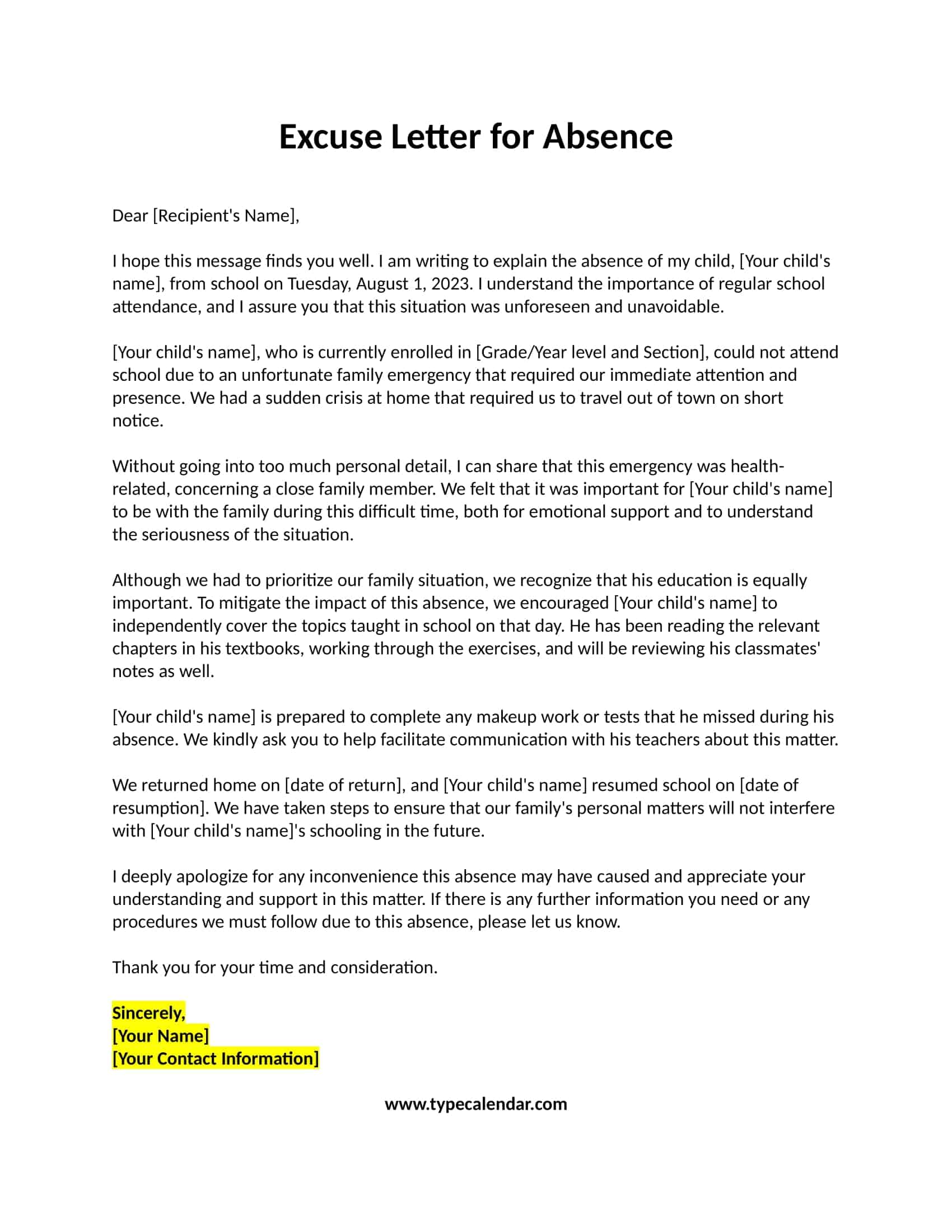Excusing yourself is not just about saying “I couldn’t come”; a properly written Excuse Letter provides trust and transparency in every process, from attendance to payroll, from parent communication to legal records. That’s exactly why TypeCalendar has prepared 42 Excuse Letter Templates, adjusted to different situation and institution languages.
Table of Contents
What It Isn’t and How to Write It Right

Although the excuse letter looks like a corporate translation of ”sorry, I couldn’t come”, it is actually like a small contract. It clearly gives the other party the (1) reason, (2) duration and (3) action plan; it prevents loss of rights that may arise from uncertainty. In short, a good Excuse Letter:
- Balances formality with friendliness: A humane explanation + institutional closing instead of a “For your information,” tone.
- It is concrete: not “I was sick”, but “I was diagnosed with a high fever and throat infection on the morning of August 6, 2025.”
- It is measure-oriented: It shows you how the delay will not affect the project/how to compensate for its impact.
TypeCalendar’s Excuse Letter Template Collection
The TypeCalendar Excuse Letter Template Collection offers a modular structure that can be flexible according to the type and duration of the excuse. The package is based on the five most common scenarios, including work absence, school absence, medical appointment, legal obligation and emergency family situation. Each scenario is divided into three levels of detail: Mini, Standard and Comprehensive.
Mini-drafts finish the job with a single paragraph for one-day or half-day permits, while Standard models contain two paragraphs and a clear action plan. For longer treatments or court cases that require more comprehensive documentation, the Comprehensive versions come into play: detailed timelines, additional file lists and a return to work plan are ready in the template. This way, the user can formalize their document in minutes by simply opening the appropriate template and filling in the blanks.
The Most Common Types of Excuse Letters
- Work Absence: Clear date and time stamps for the HR system.
- School Absence: Parent/guardian signature, doctor’s note reference, and a make up-lesson plan.
- Medical Appointment: Appointment and return times for scheduled checkups.
- Legal Obligation (Court/Jury Duty): Include the case number or the court summons.
- Family Emergency: Attach hospital admission papers or travel proof to substantiate the claim.
File Formats and Sharing Shortcuts
All templates ship in multiple formats for easy sharing. DOCX and Google Docs files allow for quick editing on desktop or mobile, thanks to automatic date fields and signature placeholders. The PDF printout of the same document, whether it is sent as an email attachment or printed from a printer with 300 dpi CMYK settings, always maintains its layout. The Pages version for Mac users keeps the typography clean, while light PNG versions are added for those who want to sign by hand on a tablet.
Conclusion
Explaining the excuse in the right words and in the right way is often stressful; time is lost while looking for a sentence. TypeCalendar has prepared 42 editable Excuse Letter Templates to speed up this process. Designed for scenarios such as work, school, medical appointments, legal obligations and emergency family situations, these templates come with date, signature and attachment fields ready; you just fill in the blanks, convert to PDF or share directly, and leave uncertainty behind in minutes.










































![Free Printable Friendly Letter Templates [PDF, Word, Excel] 1st, 2nd, 4th Grade 1 Friendly Letter](https://www.typecalendar.com/wp-content/uploads/2023/05/Friendly-Letter-150x150.jpg 150w, https://www.typecalendar.com/wp-content/uploads/2023/05/Friendly-Letter-1200x1200.jpg 1200w)
![Free Printable Congratulation Letter Templates [PDF, Word] Examples 2 Congratulation Letter](https://www.typecalendar.com/wp-content/uploads/2023/05/Congratulation-Letter-150x150.jpg 150w, https://www.typecalendar.com/wp-content/uploads/2023/05/Congratulation-Letter-1200x1200.jpg 1200w)
![43+ Printable Leave of Absence Letter (LOA) Templates [PDF, Word] / Free 3 Leave of Absence Letter](https://www.typecalendar.com/wp-content/uploads/2023/01/Leave-of-Absence-Letter-150x150.jpg 150w, https://www.typecalendar.com/wp-content/uploads/2023/01/Leave-of-Absence-Letter-1200x1200.jpg 1200w)
